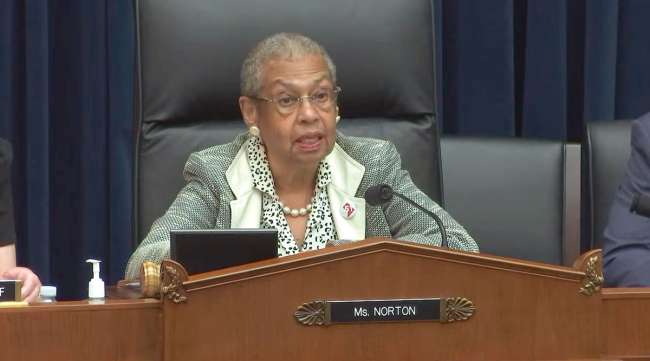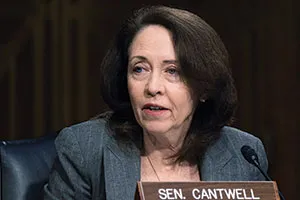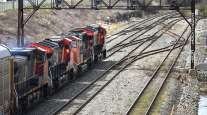Senior Reporter
Congressional Democrats Push Rail Safety Bills

[Stay on top of transportation news: Get TTNews in your inbox.]
To mark the anniversary of a freight train derailment in Ohio, policymakers renewed calls for approving a legislative response as the industry highlights safety improvements.
Del. Eleanor Holmes Norton (D-D.C.), the Highways and Transit panel’s top Democrat, recently pressed colleagues to support a bill that would provide grants for mitigating the impact of derailments on communities.
“While trains are a critical mode of transportation, last year’s Norfolk Southern train derailment in East Palestine demonstrated the need for increased safety measures to protect the residents who live near train tracks. Physical barriers, like the kind my bill would provide for, have proven effective in mitigating the harmful effects of both train noise, vibrations and derailments,” Norton explained on Feb. 5.
House Republican leaders, meanwhile, have not announced a schedule for considering rail legislation that responds specifically to last year’s derailment.

Sen. Maria Cantwell says since the derailment in Ohio, "rail safety has headed in the wrong direction." (Jim Watson/Pool via Associated Press)
On the Senate side, Commerce Committee Chairwoman Maria Cantwell (D-Wash.) continues to push for passage of her comprehensive legislation. The bipartisan Railway Safety Act was approved in committee weeks after the derailment in the Buckeye State.
“In the year since the East Palestine derailment, rail safety has headed in the wrong direction,” Cantwell said Jan. 31. “The number of derailments since East Palestine has increased by over 13% while most railroads have failed to follow through on their simple commitment to join the Department of Transportation’s close-call reporting program.”
The chairwoman continued, “With over 80 million Americans living within 1 mile of a Class I railroad track, Congress must pass the Railway Safety Act to strengthen oversight over the railroads and get safety back on track.”
The Railway Safety Act would update policies at the Federal Railroad Administration and the Pipeline and Hazardous Materials Safety Administration. Sen. J.D. Vance (R-Ohio) is the bill’s lead co-sponsor. He recently called on the Biden administration to enhance access for long-term health screening programs in East Palestine.

Vance
“You’ve got to give people confidence that long-term chronic exposure is not going to give them problems. That’s why we’ve pushed the health screening stuff so aggressively, and why we frankly need the Biden administration to step up and help us,” the Ohio senator said earlier this month.
In response to the Ohio derailment, the Biden administration pointed to funding provided for rail safety projects. The administration also took aim at congressional Republicans as well as the rail industry. “Congress and the railroads have yet to take meaningful action to address rail safety. In fact, House Republicans have voted twice to pass legislation that would slash rail safety funding and cut track inspections,” according to a “Factsheet on Rail Safety” the U.S. Department of Transportation published Feb. 1. “Achieving the highest level of rail safety requires active and continued partnership from Congress. And rail companies must also take urgent, dedicated action that includes not just complying with current standards, but decisively putting the long-term safety of workers and communities ahead of short-term opportunities to supercharge profits.”

Jefferies
The Association of American Railroads, which represents freight rail operators, disagreed with DOT’s claim about the industry. The group explained that following the Ohio derailment, the industry’s quick and wide-ranging response included: “increasing the frequency of hot bearing detectors across key routes,” “developing uniform recommendations for proactively identifying bearings that may become problematic,” and “training emergency responders.”
“Railroads are wholeheartedly dedicated to advancing safety through our own initiatives and collaborative efforts with DOT,” AAR president and CEO Ian Jefferies wrote Transportation Secretary Pete Buttigieg on Feb. 5. “We hope you will take advantage of future opportunities to make sure the public understands that freight rail is essential to our nation and already very safe, and that the railroads are 100% onboard in our shared enterprise to make freight rail as safe as it can be.”
On Feb. 3 of last year, a Norfolk Southern freight train derailed in East Palestine. An investigation by the National Transportation Safety Board is ongoing.
Want more news? Listen to today's daily briefing below or go here for more info:




